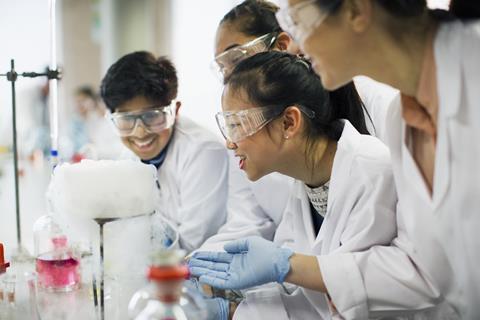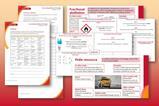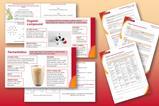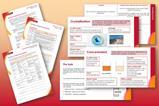Catherine Smith reports on a study to assess the impact of the reformed A-level chemistry qualification

In summer 2017 the first cohort of students to have studied for the reformed A-level chemistry qualification sat their final exams. In the new qualification, the assessment arrangements for practical work have changed significantly: students’ practical skills are now assessed indirectly through written examinations, and directly by their teacher whilst carrying out a minimum of 12 hands-on practical tasks. During the direct assessment, students are assessed against criteria which reflect the broad competencies that A-level science students are expected to develop; if successful, they receive a separate practical endorsement.
Several studies have assessed the impact of these changes. Ofqual is part way through a programme of research to evaluate the impact of the reform on student practical skills, and Barnes et al have surveyed teachers as part of a wider study on the overall impact of the new A-level chemistry qualification on students entering university in 2017/18.
For this study I carried out online surveys of students who had studied for the pre-reform A-level qualification and students who had studied for the post-reform qualification to compare their experience of, and confidence in, various aspects of practical chemistry, and analysed the results for significance. The students were drawn from various universities and completed the survey either as part of a compulsory pre-lab activity or voluntarily.
In 2011 I circulated an online survey to first-year students starting an undergraduate degree course in chemistry or foundation science. The students were questioned on their experience of practical chemistry at school, and asked to rate their confidence in using a range of apparatus and carrying out a number of techniques. I filtered responses to include only those students who had studied for an A-level qualification. In total I obtained 454 responses from students studying at 11 institutions.
In 2017 I repeated the survey, and again filtered responses to include only those students who had studied for the reformed A-level qualification. I obtained 156 responses from five institutions.
The results showed some clear differences between pre- and post-reform confidence in practical skills.
Less practical work in chemistry lessons?
My results show a significant shift (c2(3) = 12.9, p < 0.01) to less practical work occurring in school chemistry lessons (table 1). This is contrary to the outcome of the Ofqual study, which reported no significant difference in the frequency of practical work with the new reforms. However, the Ofqual study compared cohorts one year either side of the reform changes, whereas in our study the students who completed the pre-reform qualification studied several years before the reform changes.
| Response | Percentage | |
|---|---|---|
| Values presented are percentages of total responses. The modal response is shown in bold. | ||
|
2011 |
2017 |
|
|
Most lessons |
6.4 |
6.4 |
|
Once a week |
45.8 |
30.1 |
|
Once a fortnight |
32.6 |
47.5 |
|
Rarely |
15.2 |
16 |
Students are more confident in using a wider range of apparatus and techniques
The results showed that, although students are spending less time doing practical work, the practical work they are doing is more focused and is having a positive effect on their confidence.
Students’ confidence in using the equipment that is required to demonstrate the techniques listed for chemistry has increased significantly (see table 2 below). For example, for a magnetic stirrer, which can be used to carry out a distillation or heat under reflux, the percentage of students who felt confident in using it without help increased from 27% in 2011 to 53% in 2017 (c2(3) = 31.6, p < 0.01). Students’ confidence dropped for only three items of equipment, all of which are uncommon in the majority of school labs. I see this decline as a positive, as it reflects an increase in students’ ability to identify equipment they are familiar with, as well as that they are not familiar with.
Students also felt more confident in carrying out a wide variety of techniques (see table 3 below), reflecting the broader range of practical experiments now being undertaken in schools. Heating under reflux, thin layer chromatography, using a separating funnel and separating two liquids by distillation are all practical techniques listed in the new reform, and students’ confidence in using these techniques increased.
Students are writing more reports but have less opportunity to discuss practical work
Students now have to keep a lab book as evidence of the practical activities completed and criteria met. My survey results suggested that students are now completing a full written report of their work more frequently, but are given less opportunity to discuss it (see table 4 below).
A positive impact for practical skills
Overall this study shows the positive impact the A-level reforms have had on students’ practical skills in chemistry. Although less practical work is taking place, a broader range of apparatus and techniques is covered, meaning students leave school with a greater confidence in their practical ability.
The full outcome of this study will be shared at the ASE annual conference, on Friday 11 January, 3.30–4.30 pm.
Acknowledgements
The original survey was completed as part of a year as an RSC School Teacher Fellow hosted by the University of Leicester and funded through the HE STEM programme. The study would not have been possible without the help of the many staff and students at universities across England who helped in the administration and completion of the survey.
References
- GCE AS and A level subject content for science, Department for Education, April 2014 (bit.ly/2PnQIQN)
- The impact of qualification reform on A level science practical work. Paper 1: Teacher perspectives after one year, Ofqual, July 2017 (bit.ly/2DyyHch)
- The impact of qualification reform on the practical skills of A level science students. Paper 2: Pre- and post-reform evaluation of science practical skills, Ofqual, May 2018 (bit.ly/2FiEEfj)
- The impact of qualification reform on the practical skills of A level science students. Paper 3: Valid discrimination in the assessment of practical performance, Ofqual, May 2018 (bit.ly/2zP83HO)
- Stephen M Barnes, Ali Laham and David Read, Teachers’ view of the impact of the new chemistry A-level on students entering university in 2017/18, University of Southampton, September 2017: http://edshare.soton.ac.uk/18928/














No comments yet